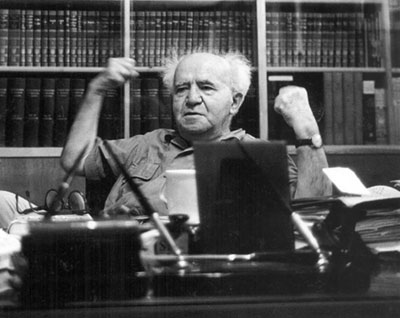| A Right to Build By DANIEL TAUBER (The Jerusalem Post, 1.7.10) MOST OF THE WORLD thinks settlements are illegal. US President Barak Obama calls them "illegitimate." Defense Minister Ehud Barak casts his crusade against settlers as mere "law enforcement." Appeasing such sentiments, the government approved the 10-month freeze on Jewish building in Judea and Samaria. But while the world calls the settlements illegal, the ban on settlement construction may itself violate Israeli law and its protections for human rights. More. | |
| Even for Gilad, this is not the way By DANIEL TAUBER (The Jerusalem Post, 12.22.09) THE PLIGHT OF YOUNG GILAD SHALIT, and the struggle of his family and parents who have worked so hard for his freedom, have captivated the nation. Never before has the absence of one person been such a personal matter for all of Israel. Yet, even for Gilad, who is still alive, there are lines that cannot be crossed and deals that cannot be made. More. | |
| Ben-Gurion's 'Pragmatism' (Letter) By DANIEL TAUBER (The Jerusalem Post, 11.25.09) SIR, - YOUR REFERENCE to former prime minister David Ben-Gurion's "uncompromising" pragmatism ("Principle & pragmatism," November 24) is somewhat puzzling, as pragmatism in politics is the art of compromising on values and principles. More. | |
| The IDF's "War on Beards" By DANIEL TAUBER & Dr. AVRAHAM GOLDSTEIN (The Jewish Press, 4.07.09) AN IDENTIFYING MARK of the Jew has been, and for many still is, his beard. The foundation for this is the commandment in the Torah: "You shall not round the corners of your heads, neither shall you mar the corners of your beard" (Leviticus 19:27). . . . Despite the significance of a beard for many Jews, the Israeli military has initiated a "war on beards," as a headline in the major Israeli daily newspaper Yediot Aharonot put it. More | |
| Adoption & the Law of Return By DANIEL TAUBER (The Jewish Press, 2.25.09) IT MAY NOT BE A "BASIC LAW," Israel's set of of semi-constitutional laws, but the Law of Return is probably the most fundamental law of the state. It certainly is the most Jewish and Zionist of all Israel's laws. The Law of Return states that "[e]very Jew has the right to come to this country as an oleh." It fulfills . . . More | |
 | PA Death Sentences Symbolize a Return to Arafat By DANIEL TAUBER (The American Thinker, 2.06.09) ON THE EVE of former U.S. Senator George Mitchell's mission to Israel as U.S. envoy in the aftermath of Israel's recent anti-terror Operation Cast Lead in Gaza, a Palestinian Authority military court in Hebron sentenced a former member of the Palestinian Authority presidential security service, Force 17, to death for the crime of collaborating with Israel in anti-terror operations. More |
In Defending Jewish Identity, Sharansky Falls Short | |
 | The U.N.'s 'Greatest Failure' (is Ours too) |
 | Is Israel a Banana Repubic? |
 | George W. Bush: Political Punching Bag |
 | Their Word is Their Bond By DANIEL TAUBER (The Jerusalem Post, 11.06.08) IS THERE ANY PROMISE an Israeli politician will not break? It may be common knowledge that politicians lie, but in the last few years, the country's politicians have reached new lows breaking their promises on matters both large and small. More |
 | Olmert's Parting Gift |
 | Hizbollah's Final Victory By DANIEL TAUBER (The Jewish Press, 7.16.08) BY EXECUTING the so-called prisoner swap with Hizbullah on Wednesday this week, the Israeli government concluded its shameful role in shirking its responsibility for the two Israeli soldiers kidnapped by Hizbullah almost two years ago. Far from being a fulfillment of the government's obligations, the deal is both a chillul Hashem (desecration of God's name) and the completion of Hizbullah's victory in the war it began with Israel in the summer of 2006. More |
 | The Iron Wall By ZE'EV JABOTINSKY, 1923 (Posted 6.15.08) IT IS AN EXCELLENT RULE to begin an article with the most important point, but this time, I find it necessary to begin with an introduction, and, moreover, with a personal introduction. I am reputed to be an enemy of the Arabs, who wants to have them ejected from Palestine, and so forth. It is not true. Emotionally, my attitude to the Arabs is the same as to all other nations – polite indifference. Politically, my attitude is determined by two principles. More |
More HADAR Articles
• Rav Kook’s Orot (Posted 6.15.08)
• American Jews Celebrate Israel’s 60th (Fern Sidman, 6.02.08)
• Shmuel Katz, Eretz Yisrael Loyalist, Dead at 83 (Larry Tauber, 5.13.08)
• Protesters Clash Outside Yom Ha'atzmaut Celebration (Fern Sidman, 5.11.08)
• When the Nazis Came to Columbia (Fern Sidman, 4.01.08)
• Our Response to the Mercaz Massacre (Daniel Tauber, 3.28.08)
• Shas and the Golden Calf (Daniel Tauber, 2.27.08)
• Out of the Mouths of Bombers (Ruthie Blum Leibowitz, Jerusalem Post, 7.16.08)
• Why Olmert Must Go (Yossi Klein HaLevi, The New Republic, 5.29.08)
• 1948 & the Palestinian-Arabs: The True Story (Efraim Karsh, Commentary, 5.01.08)
• Zionism's Bleak Present (Daniel Pipes, Jerusalem Post, 10.10.07)
• Herzl on Judaism and the State (Alex Safian, Camera, 9.30.02)
• Jabotinsky Most Popular Street Name in Israel (Ynetnews, 11.11.07)





